Published in Nacional number 659, 2008-06-30
Phony morale
Wealth of the Owners of Feral
As owners of the Feral Tribune, Heni Erceg, Viktor Ivancic and Zoran Erceg collected millions from foreign donors and evaded state taxes, all the while developing a lucrative real estate business
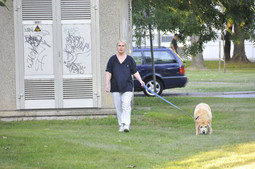 At the start of her career as a HTV correspondant, Feral’s editor-in-chief Heni Erceg lived in a rented flat; today she trades real estate in Split and Zagreb “After more than fifteen years of regular publication, you hold the final edition of the Feral Tribune in your hands. Despite having a stable circulation in recent years, despite cutting editorial and production costs to a minimum, due to accumulated debts over a long period and the one-sided termination of negotiations with a potential business partner Europapress Holding (which we considered to practically be a done deal), we are no longer able to publish the weekly magazine. At this time, the Feral editors and journalists are dealing with insurmountable difficulties,” was the introductory note in the last, though perhaps not final, edition of the Feral Tribune published on 20 June 2008. In this unsigned note, the author blames the relentless market which no can no longer tolerate newspapers without advertisements. To blame is the evil marketing industry, which has not erected such an impenetrable wall against any other media in the country. Also to blame is Ninoslav Pavic, the CEO of Europapress Holding, for no longer wanting to finance and print the newspaper for free. Everyone is to blame, everyone, that is, except the management of the newspaper: Heny (Heni) Erceg, editor in chief, editors Viktor Ivancic and Predrag Lucic, and director Zoran Erceg.
At the start of her career as a HTV correspondant, Feral’s editor-in-chief Heni Erceg lived in a rented flat; today she trades real estate in Split and Zagreb “After more than fifteen years of regular publication, you hold the final edition of the Feral Tribune in your hands. Despite having a stable circulation in recent years, despite cutting editorial and production costs to a minimum, due to accumulated debts over a long period and the one-sided termination of negotiations with a potential business partner Europapress Holding (which we considered to practically be a done deal), we are no longer able to publish the weekly magazine. At this time, the Feral editors and journalists are dealing with insurmountable difficulties,” was the introductory note in the last, though perhaps not final, edition of the Feral Tribune published on 20 June 2008. In this unsigned note, the author blames the relentless market which no can no longer tolerate newspapers without advertisements. To blame is the evil marketing industry, which has not erected such an impenetrable wall against any other media in the country. Also to blame is Ninoslav Pavic, the CEO of Europapress Holding, for no longer wanting to finance and print the newspaper for free. Everyone is to blame, everyone, that is, except the management of the newspaper: Heny (Heni) Erceg, editor in chief, editors Viktor Ivancic and Predrag Lucic, and director Zoran Erceg.
Heny and Zoran Erceg were previously married, and today have a 33-year old daughter Tena, who is also employed at Feral. For more than 10 years, Heni has been in a common law marriage with Viktor Ivancic. And it is these two who are most to blame for the demise of the Feral, not just due to their editorial policies, but mostly due to their shady financial dealings, which they have managed to keep quiet until now. During the greatest time of crises in the newspaper, the top people in Feral were purchasing valuable property in their name in Zagreb and Split. These dealings are perhaps worth more than a million euro, and it is uncertain as to where the money came from. While they kept their employees working for minimum wage and continuously begged foreign institutions for donations, they evaded paying state taxes and refused to pay the printing costs to the Croatian printers, they became rich by sucking money out of Feral and acquiring ownership of apartments in the centre of Zagreb and Split. Nacional is in possession of documentation proving this.
Back in 1989, when she was a correspondent for Zagreb TV in Split, Heni Erceg herself wrote a description of her difficult social situation: “Before that (ed note: before becoming a journalist), I did all kinds of jobs. I looked everywhere, and even sold tickets at the train station. Then journalism happened. And I’ve never regretted it, even when it’s difficult, even when I have little time for my family, and though we’re still tenants. I truly live a humble life”. At that time, she was still married to Zoran Erceg, so they were both tenants. Already by 1992, Heni Erceg was registered as living at Miroslava Krleze 8 in Split. In 1999, she lived one street over, on Kukuljeviceva St. 3 in an apartment which she owned and later sold. Four years ago, she was owner of an apartment on Omiska St. 3, and it is well known that the previous owners had asked an initial sales price of EUR 180,000. After purchasing it, she sold the flat only months later. A debt list hung inside the main foyer of the building shows that she failed to pay the maintenance fees during the time she owned the flat.
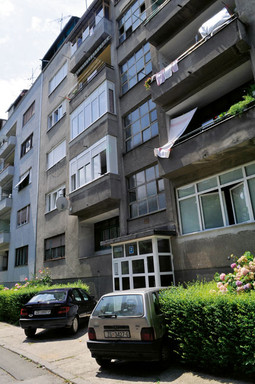 In 2000, Tena Erceg purchased a 47m2 flat in Zagreb when she was only 25 years old Later, she and her common law husband Viktor Ivancic purchased a flat at Bacvice, at the address Viska St. 15. Considering that Viktor Ivancic left his first wife and son for Heni Erceg, he allegedly also left them one flat. There was a rumour that Erceg and Ivancic were looking to buy another flat at Bacvice last year. They were asking about a flat on Pojisanska St., only 500 m from their home on Viska St. They were ready to pay about EUR 200,000 for the new flat, which is particularly interesting given the fact that the building is planned for demolision, thereby ensuring compensation from the City of Split. Evidently, the couple were very well informed in the happenings on the real estate in Split.
In 2000, Tena Erceg purchased a 47m2 flat in Zagreb when she was only 25 years old Later, she and her common law husband Viktor Ivancic purchased a flat at Bacvice, at the address Viska St. 15. Considering that Viktor Ivancic left his first wife and son for Heni Erceg, he allegedly also left them one flat. There was a rumour that Erceg and Ivancic were looking to buy another flat at Bacvice last year. They were asking about a flat on Pojisanska St., only 500 m from their home on Viska St. They were ready to pay about EUR 200,000 for the new flat, which is particularly interesting given the fact that the building is planned for demolision, thereby ensuring compensation from the City of Split. Evidently, the couple were very well informed in the happenings on the real estate in Split.
Heni Erceg purchased her first apartment in Zagreb in 1999. This was a one-room flat of 43.34 m2 at Alage Gaje 5, near the Zagrepcanka Tower. One year later, in May 2000, she purchased another flat nearby, at Alage Gaje 2. This flat was 47.66 m2 and was purchased in her daughter’s name, Tena Erceg, who at the time was 25 years old. Later, in May 2002, she sold the flat at Alage Gaje 5, and in October 2002, Erceg and Ivancic purchased a 98m2 flat at Vojnoviceva 19, near St. Peter’s Church in Zagreb. One year later, in October 2003, 28-year old Tena purchased a 59.26m2 flat one street over, on Brescenska St. 3. The contract states a selling price of EUR 64,000 or EUR 1080/m2 for this flat in the centre of Zagreb.
At that time, the price of flats in this desirable location were at least 50 percent higher, which poses the question of whether they reduced the selling price on paper in order to evade paying property transfer tax. Such manipulations were possible, as they paid in cash. It is interesting to note that Tena Erceg sold this flat only four months later, in February 2004.
Erceg and Ivancic sold their flat in Vojnoviceva St. in March of this year. At just about the same time, they purchased a 56.22m2 flat at Fausta Vrancica 2, just two streets down from where her daughter Tena lives. They stay in this flat when they come to Zagreb, but they are continuing to look for another flat in the centre of the city. Nacional has learned from reliable sources that they have recently been asking about a flat on Brescenska St., the same street where they already bought and sold one flat. They were prepared to pay EUR 300,000 in cash, but the owner was resolute in asking EUR 350,000. Heni Erceg did not immediately accept this price, but after a while returned saying that she was ready to pay the full price. However, the owner said that she had already found another buyer who had given a down payment, and Erceg was furious and demanded she cancel the deal because she wanted to be the one to buy the flat, but the owner refused.
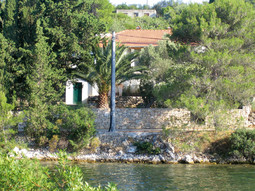 In addition to a house in Necujem that she inherited from her fahter, Heni Erceg bought a house with a 500 m2 yard and 379 m2 orchard at Grohote on the island of Solta It must also be noted that the couple invested additional money to renovate virtually every flat, though it is hard to tell how much money. It is also unknown how much money was invested in the complete restoration of her father’s house in Necujem on the islan of Solta, which she inherited. However, the entire Feral office was made aware that she had ordered tiles from Italy. Later, she bought a house with a 500 m2 yard and 379 m2 orchard in Grohote, also on the island of Solta.
In addition to a house in Necujem that she inherited from her fahter, Heni Erceg bought a house with a 500 m2 yard and 379 m2 orchard at Grohote on the island of Solta It must also be noted that the couple invested additional money to renovate virtually every flat, though it is hard to tell how much money. It is also unknown how much money was invested in the complete restoration of her father’s house in Necujem on the islan of Solta, which she inherited. However, the entire Feral office was made aware that she had ordered tiles from Italy. Later, she bought a house with a 500 m2 yard and 379 m2 orchard in Grohote, also on the island of Solta.
In addition to the above, there are two flats, one in Split and one in Zagreb, that two loyal readers left to Feral. The entire editorial office knew about these flats, but kept the details strictly confidential. Nacional has learned that one of these flats is likely the one in Pozeska St. 1 in Split, as all the leaders of Feral were registered as its owners - Heni Erceg, Viktor Ivancic, Zoran Erceg and Predrag Lucic. We have not yet succeeded in revealing the Zagreb glat. There is also another flat in the Meje district of Split that is owned by Zoran Erceg.
In other words, while they were publicly producing the Feral Tribune, the editors of the newspaper had private dealings buying and selling real estate, and turning over hundreds of thousands of euro. Of course, Croatian citizens, like all others, have the right to do what they please with their money, including investing in real estate. But the question remains as to whose money Heni Erceg and Viktor Ivancic were investing, obviously with the blessing of Zoran Erceg and Predrag Lucic. In order to establish this, we need to go back to the inception of the Feral Tribune.
It was back in 1984 when three good friends and young intellectuals, Viktor Ivancic, Predrag Lucic and Boris Dezulovic, working undr the name Studio Viva Ludez, launched Feral as a satirical supplement to the weekly Nedjeljna Dalmacija. When Miroslav Kutle purchased Slobodna Dalmacija in the early 1990s, and the first accusations that Feral was an “anti-Croatian” publication, they refused to write for the paper and instead, launched the Feral Tribune as an independent newspaper in 1993. Another founder of the newspaper was journalist Jelena Lovric, who invested her own money in the project.
In Tudjman’s time, Feral Tribune mocked nationalism and “Great Croatism”. During the war, the newspaper put a photomontage of Tudjman embracing Milosevic on the front page. And then, 15 years and 1185 editions later, the newspaper destroys itself. One of the reasons why the Feral Tribune after 2000 was no longer what it was in the 1990s was because more than 50 journalists left the paper in its 15 year history. Many of whom who were very important to the paper were virtually forced out. Boris Dezulovic, Jelena Lovric, Igor Mandic, Zlatko Gall, Toni Gabric, Miljenko Jergovic, Ante Tomic, Robert Perisic, Ivica Ivanisevic, Tatjana Gromaca, Nebojsa Taraba, Gordan Malic, Boris Raseta and Vedrana Rudan are only a few of the journalists who left Feral for various reasons. Some left because they received better financial job offers. But a certain number left because, to put it mildly, they disagreed with the Feral management. One of these was Boris Dezulovic, one of the founders, who left in November 1999 after a conflict with Heni Erceg.
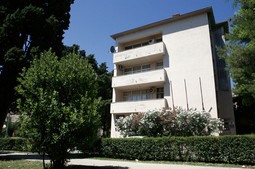 The Split office of Feral Tribune is at the address Šetalište Bačvice 10, and our information states that they did not have to pay rent for the space Columist and writer Dermano Cico Senjanovic also left after a conflict with Heni Erceg after he wrote a few lines criticising her friend Vesna Pusic. At the end of 1998, Renato Baretic, one of Croatia’s most award-winning writers, also left. During last year’s negotiations on the fate of Feral, he wrote a column in Slobodna Dalmacija recommending all future investors in Feral to first study all the company’s books and the assets of the leading people in the newspaper. After that, one of Feral’s editors and founders, Predrag Lucic proclaimed him an alcoholic in an article, saying that Baretic was the “best known beer drinking among the Croatian writers, and the best known writer among Croatian beer lovers”. To the uninformed reader, it seemed as though Baretic was a selfish, vengeful and ungrateful person. However, Baretic was not the only person to learn what it meant to oppose the Feral leadership. But he is one of the few who did not yield afterwards. Insulted and tarnished, he decided to prove that he was not speaking offhand or lying. In a column in Slobodna Dalmacija on 7 July 2007, he published a virtually complete list of the apartments traded by Heni Erceg and Viktor Ivancic, with the participation of her daughter Tena Erceg. In doing so, he mentioned that when he stated they should check all their assets, that he did not mean Predrag Lucic, who owns nothing but a few books and CDs.
The Split office of Feral Tribune is at the address Šetalište Bačvice 10, and our information states that they did not have to pay rent for the space Columist and writer Dermano Cico Senjanovic also left after a conflict with Heni Erceg after he wrote a few lines criticising her friend Vesna Pusic. At the end of 1998, Renato Baretic, one of Croatia’s most award-winning writers, also left. During last year’s negotiations on the fate of Feral, he wrote a column in Slobodna Dalmacija recommending all future investors in Feral to first study all the company’s books and the assets of the leading people in the newspaper. After that, one of Feral’s editors and founders, Predrag Lucic proclaimed him an alcoholic in an article, saying that Baretic was the “best known beer drinking among the Croatian writers, and the best known writer among Croatian beer lovers”. To the uninformed reader, it seemed as though Baretic was a selfish, vengeful and ungrateful person. However, Baretic was not the only person to learn what it meant to oppose the Feral leadership. But he is one of the few who did not yield afterwards. Insulted and tarnished, he decided to prove that he was not speaking offhand or lying. In a column in Slobodna Dalmacija on 7 July 2007, he published a virtually complete list of the apartments traded by Heni Erceg and Viktor Ivancic, with the participation of her daughter Tena Erceg. In doing so, he mentioned that when he stated they should check all their assets, that he did not mean Predrag Lucic, who owns nothing but a few books and CDs.
The purchase of this property would not anything of interest had Heni Erceg and Viktor Ivancic been owners of a successful newspaper with large profits, and not at the helm of a publication that needed regular saving. And the list of those who participated in its salvation is quite a long one. What is well known is that in the 1990s, Feral received large financial support from several international organizations, such as the Open Society Institute, Press Now Amsterdam, Swedish Helsinki Committee and many others we will never know about. We will also never know just how many hundreds of thousands or millions of euro they received from abroad, or how that money was spent: to finance the paper and court cass, or to buy apartments. People who once ran the Croatian Open Society have confirmed that Feral Tribune had received several hundreds of thousands of dollars from them alone. In addition to accounts in Croatia, those close to Feral at the time claim that they also received donations to an account in Graz, Austria. It is not known who the account owners were, but it is known that on several occasions, their driver took Heni Erceg and Viktor Ivancic to Graz and waited for them in front of the bank.
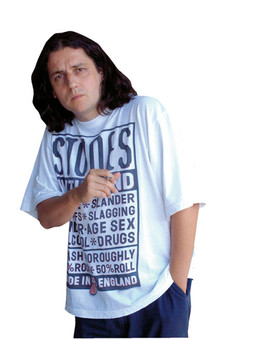 PREDRAG LUCIC, founder of the Feral, who did not have much material gain The Feral journalists were convinced that the newspaper was hard pressed to pay their salaries, though Zoran Erceg would often say that he could see the light at the end of the tunnel. When the Feral leadership decided in 2004 to cut staff salaries by 30%, the journalists agreed on the condition that they be allowed to review the books, because they suspected their boss’ property dealings and that the financial situation in the newspaper was not in order. The head of the union was Toni Gabric. Even though he had worked at Feral for a decade, after trying to get insight into the books, his articles were no longer good enough for the editors. He quickly realized that it would be best if he left on his own accord, and he signed the termination papers.
PREDRAG LUCIC, founder of the Feral, who did not have much material gain The Feral journalists were convinced that the newspaper was hard pressed to pay their salaries, though Zoran Erceg would often say that he could see the light at the end of the tunnel. When the Feral leadership decided in 2004 to cut staff salaries by 30%, the journalists agreed on the condition that they be allowed to review the books, because they suspected their boss’ property dealings and that the financial situation in the newspaper was not in order. The head of the union was Toni Gabric. Even though he had worked at Feral for a decade, after trying to get insight into the books, his articles were no longer good enough for the editors. He quickly realized that it would be best if he left on his own accord, and he signed the termination papers.
The issue of the financial malversations in Feral has long been a case which the financial and tax inspections and the State Attorney’s office and corruption office should have long ago looked into. However, the problem is that any authority who dared to touch Feral would have likely immediately been declared anti-democratic and trying to suffocate the freedom of the press. Due to this status, all the authorities have looked the other way. In the 1990s, Feral had excellent sales of at least 40 thousand copies each week, according to some estimates. And the price of Feral, at 15 kuna in recent years, has always been 20% higher than other political publications. The price of printing one copy on roll paper is about one kuna, so that printing costs were not an excessive line item in the budget. Consider that about half the copies were sold at newsstands, and the other half on the street, the actual sales were kept strictly confidential, hidden from both the journalists and the government. There are some suspicious that the share of the distribution sold by street vendors was not fully reported to the government. One can only speculate about the revenues earned from direct sales, where that money went, and how much tax was evaded in the process.
Proof that Feral was systematically evading taxes is seen in the fact that from 1994 to 2000, journalists were registered as having only secondary school qualifications and received the minimum wage salary of between 1800 and 2300 kuna, while the remaining salary was paid to them either in cash or on contract. Considering that the average number of employees was usually around 40, this meant at least half a million kuna in taxes was saved, or at least 3 million kuna in those 6 years. Meanwhile, Feral had several profitable projects. It published a marketing publication called Banak, and for a while managed a printing press in Split that they received from the Soros Foundation, only to sell later one. They also published a library of books. They had several registered companies: Feral Tribune, Kultura i rasvjeta and Viva Ludez, with Zoran Erceg registered as the director of all the companies. There is also the company Feral Projekt, registered at Jurisiceva 23 in Zagreb, where Vesna Pusic, Slavko Goldstein, Viktor Ivancic and Boris Dezulovic listed as members of the board.
Despite all these companies, foundations, donations and projects, Feral’s debt of value added tax grew from year to year. Confidential sources claim that today that debt has climbed to several million kuna. The state cannot and must not forgive this debt, but continues to turn a blind eye. And not only that. Just before last year’s elections, when Feral was in serious danger of bankruptcy, the government itself lobbied to save the newspaper. Premier Sanader could not allow the newspaper that not even Tudjman’s government could shut down before such an important election. Allegedly, there were warnings from Brussels as well. Thus, Sanader approved a secret payment of a million kuna to be transferred to Feral from the state budget. A high ranking source from the government has confirmed this fact for Nacional, and this fact is easy to confirm in the minutes of the 24th government session from 29 May of this year. After the state administration learned about the real estate dealings of the Feral owners, it was quickly decided that no further assistance be given to the newspaper. Before this, however, the politicians even lobbied with the owners owners of other media companies in trying to find a buyer for Feral.
The leadership of the NCL Media Group also received several suggestions from the state administration to buy Feral, but refused. An interim agreement was reached with Ninoslav Pavic of Europapress Holding by which Slobodna Dalmacija took over the printing costs of Feral, and a part of the costs for payment of salaries. Feral remained more than 5 million kuna in debt to Pavic. It is unknown why the talks on the sale of Feral to EPH fell through. Confidential sources claim that the Feral editorial board had excessive demands in the deal, and the EPH managers called them “ungrateful lunatics”. In recent days, a new rumour has surfaced that Robert Jezic, the new owner of Novi List, was planning to take over Feral, but Novi List has since denied that claim. Namely, the Feral owners signed a cooperation agreement with the former owners of Novi List. The new owners are not against cooperation with Feral, but only on the condition that Feral settle the printing debts which are in excess of 2 million kuna, and to play upcoming printing in advance.
There is a strong suspicion that over al these year, the Feral administration has taken financial advantage of foreign donors, the state and Croatian printing, and has paid its employees minimum wage. Is it not hypocritical to put on a public façade as a newspaper that fights for justice, honesty and against crime, while financially using everyone for their own benefit? It is unusual that none of the present or former employees took a stance against this unethical and illegal conduct.
“Feral Tribune is owned by those who write for it and those who read it” is what the masthead reads. Do the people who spent a good portion of their lives working and writing there out of a sense of conviction feel cheated and betrayed after learning that their bosses secured their own prosperity, with Feral and without it? And why has no one, other than Senjanovic and Baretic, dared to speak up? The answer to these questions was given by Damir Pilic, another journalist who left the newspaper after a conflict with the editorial board. He said, “We don’t want to talk about it, not in order to protect the Feral editorial board, but to protect all those people to whom Feral meant something in the 1990s, our readers. Those who have a good opinion of Feral, and no one wants to tarnish that opinion. The only people to have the moral rights to talk about it are Cico Senjanovic and Boris Dezulovic. Feral had an undisputable role, we all worked there out of our own convictions and we are proud to have created Feral”.
Latest news
-
28.10.2010. / 14:15
'A profitable INA is in everyone's interest'
-
28.10.2010. / 09:38
Sanader’s eight fear SDP — Won’t bring down Government
-
21.10.2010. / 15:02
Interior Ministry turned a blind eye on Pukanic assassination
-
20.10.2010. / 09:34
Barisic could bankrupt HDZ



